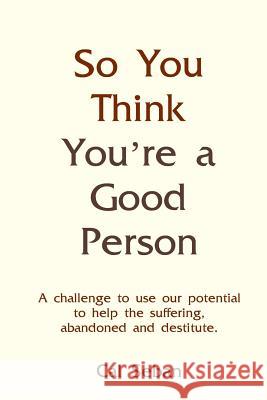So You Think You're A Good Person » książka
So You Think You're A Good Person
ISBN-13: 9781490925059 / Angielski / Miękka / 2014 / 378 str.
The author's intent is to call into question the validity of a belief about human nature that enjoys almost universal acceptance. He contends that there is a huge difference between the "good" people we think we are, and what we're really like. He hopes this book will challenge us to evaluate ourselves and our core values. This book is about us-our humanity and our inhumanity, our selflessness and our self-centeredness, our compassion and our indifference. It is about the age old question of what we're really like in the depths of our being. Most assume that, "basically, we're good people." Isn't that just the way it is? Isn't that what everybody thinks? If people feel like their self-image, integrity or reputation is being threatened, we often hear them say, "I'm a good person " It would be pretty hard to live with yourself if you weren't able to maintain some semblance of self-worth. We've taken it for granted that, "basically, we're good people." Something we've just assumed to be a given has been elevated to the status of truth. The reader will be asked to do some soul searching as to the validity of this widely held belief. Two key factors in making any assessment of whether or not we're "good people" are the standard by which we measure ourselves with respect to charitable giving and volunteerism. The reader is challenged to reevaluate his or her standard of what a good person is. Furthermore, this book asks the reader to take action based on an understanding of what it means to be a good person. Do you want to go with the flow, or start struggling against the strong cultural currents of ethics, morals and values that seek to pull us along with everyone else? The author's reason for writing is that he hurts for and is concerned about those who are less fortunate - those dying from starvation or disease and those living in conditions that make it difficult to maintain any semblance of dignity and hope. He challenges the reader to use his or her potential to help the suffering, the abandoned and the destitute. The book addresses many current high-visibility issues that are relevant and part of today's conversation: income inequality and the wealth gap, the fading of the American Dream and the decline of the middle-class, government regulation and the Volcker rule, bank penalties for actions taken during the mortgage crisis and the anniversary of Lyndon Johnson's declaration of a War on Poverty, Congressional gridlock and Pope Francis' emphasis on the need to care for the poor and the marginalized. The dynamics involved in these issues demonstrate the author's belief about the nature of man, exemplified by lives of self-interest, greed and indifference. The author probes our tendency to look out not just for the needs of ourselves and our own, but also our wants, at the expense of the unmet needs of others - many of whom are living in misery and despair. This book gives the author's perspective on how all of these issues fit into the big picture of the meaning of life.
Zawartość książki może nie spełniać oczekiwań – reklamacje nie obejmują treści, która mogła nie być redakcyjnie ani merytorycznie opracowana.











